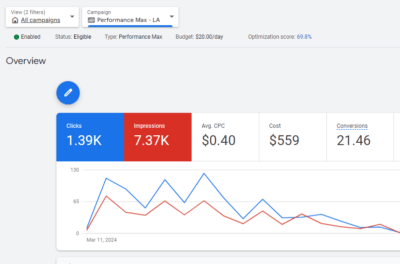This ultimate guide on SEO for Psychiatrists will teach you the latest strategies and ways to increase your practice rank on Google. Having a solid foundation in SEO will help you rank #1 on Google and increase traffic.
Boosting your SEO, not only will increase your site traffic but also help increase your reputation and trust. Ranking #1 on the Google search engine results page can give your website some credibility. This makes potential patients believe that your practice is more credible and reliable than others ranking below you.
Table of Contents
ToggleSEO for Psychiatrists
Search Engine Optimization (SEO) is the art and science of improving a website using different tactics to improve the ranking. SEO has a complex algorithm that, if used in the right way, could increase the number of organic visitors to a site.
With Google’s ranking algorithm constantly changing, marketers have to keep up with these updates that occur within SEO.

SEO requires effort over the long term (12-16 months). If you are short on time and want a way to expand your brand quickly, try Google Ads. Check out our article on Google Ads for Psychiatrists. We will guide you through the how-to of generating traffic for your clinic using a paid advertising platform.
Good SEO for Psychiatrists starts with excellent content. You want your audience to find your content special and valuable to them. Providing informative content will increase your traffic and supply growth to your company.
Some Questions That We Will Cover Throughout This SEO Strategy Guide Are:
- How to create a convincing website?
- What is considered “good content”?
- What are some areas of your website to optimize?
- How to convince your patients to book an appointment with your clinic?
To create a compelling website, you need to drive traffic to your website that will lead to a rank #1. Draw out your competition by starting with a solid SEO foundation.
Understanding The Importance of SEO to Psychiatrists
Like many other medical businesses, providers have the same goal. They want to maintain a constant flow of appointment bookings from patients. This can be highly competitive, so how do we accomplish this?
Using Top Line SEO Strategies, we will attract more patients while hand-in-hand increasing the company’s revenue.

99% of all website visitors scroll through page 1 only. Do your research on what your audience (aka patients) would typically search for. To create traffic, you need high-quality keywords within your website. The more traffic you have, the faster you will accumulate appointments, thus increasing revenue.
Google decides which website appears first on the search engine results page depending on the site’s SEO. Use Google’s algorithm against itself to outrank your competitors.
How do we influence Google’s algorithm? Read on to find out more, or let our friendly team explain to you.
SEO vs Google Ads
When you’re a psychiatrist, one of the biggest questions about marketing online is whether you should use Google Ads or rely on SEO. Think of Google Ads like renting a billboard on a busy street; your practice’s name shows up right away when someone searches for “psychiatrist near me,” but as soon as you stop paying, your ad disappears.
SEO, on the other hand, is more like building up your reputation through word-of-mouth: it takes time and effort to grow, but once it’s established, it keeps providing shade (or in this case, steady new patients) without needing constant payments.
Google Ads can be helpful if you want results fast, like when you’ve just opened your practice or are trying to fill open appointment slots quickly. SEO is slower to build but creates long-lasting visibility, trust, and credibility because patients see your website showing up naturally in search results, not just because you paid for it. For psychiatrists, the best strategy is usually a balance using ads for quick visibility while investing in SEO to build a strong foundation that keeps attracting patients over time.
Local SEO
Local SEO is all about helping people in your own community find you when they need psychiatric help. Imagine someone in your city searching on their phone for “psychiatrist near me” or “help with anxiety in Los Angeles.”
If your practice has a strong local SEO, your name will show up in those searches often, right on the map at the top of Google. That means patients can see where your office is, read reviews, and call you with just one click. To make this happen, you need to claim and fully set up your Google Business Profile with accurate information like your hours, phone number, services, and even photos of your office.
You also want to keep your details consistent everywhere online, like health directories, review sites, and local listings, so Google trusts your information. Another big part of local SEO is reviews; when patients leave positive feedback, it builds trust for both Google and people searching. For psychiatrists, this is especially important because patients want someone nearby who feels reliable and approachable. Strong local SEO makes sure you’re not just visible, but also seen as the go-to psychiatrist in your community.
Google Business Profile (Previously Called Google My Business)
A Google Business Profile is like your practice’s online business card, but much more powerful. When someone searches for a psychiatrist in your area, your profile can pop up on Google Maps and in the local results, showing people exactly where you’re located and how to contact you. It’s free to set up, but it only works well if you fill it out completely and keep it updated.
This means adding office hours, phone number, website, and services so patients don’t have to guess about what you offer. You can also upload photos of your office to make it feel more welcoming and less intimidating, which can be very important for people who are nervous about reaching out for help. One of the biggest benefits is reviews when patients leave kind, honest feedback; it gives new patients confidence in choosing you.
Google also uses those reviews to decide how often to show your profile, so the more positive reviews you have, the more visible you’ll be. For psychiatrists, a strong Google Business Profile isn’t just about being found; it’s about making that first impression count and showing potential patients that you are trustworthy, professional, and ready to help.
Competitive Offer
In the world of mental health, patients often have several choices when looking for a psychiatrist, so it’s important to show what makes your practice stand out. This is called having a competitive offer. It doesn’t mean you need to lower your prices or compete like a store sale; instead, it’s about highlighting the unique value you bring.
Maybe you specialize in certain areas like child psychiatry, trauma, or medication management. Maybe your office has flexible scheduling, telepsychiatry options, or a welcoming environment that helps patients feel comfortable right away. You can also make your competitive offer clear by showing your credentials, years of experience, or a patient-centered approach that sets you apart.
The key is to communicate these strengths clearly on your website, Google Business Profile, and even in blog posts so that when someone is comparing psychiatrists online, they immediately see why choosing you makes sense. Having a strong competitive offer not only attracts new patients but also builds long-term trust because people know you’re offering something they can’t easily find elsewhere.
Understanding Keywords
Understanding keywords is like learning the language your future patients use when they search online for help. A “keyword” is simply the word or phrase someone types into Google, and for psychiatrists, these words often show what a person is struggling with or what kind of help they want. For example, someone might search something broad like “psychiatrist near me” (that’s a short keyword), while another person might type “psychiatrist for depression and anxiety in Los Angeles” (that’s a longer, more specific keyword).
Short-Tail Keywords
Short-tail keywords are search terms created of three words or fewer. They cover broader search queries and are also known as the “head keyword”. These keywords have extensive search volume and competition.
Short-tail keywords are used when marketers first begin their keyword research… in search of ideas.
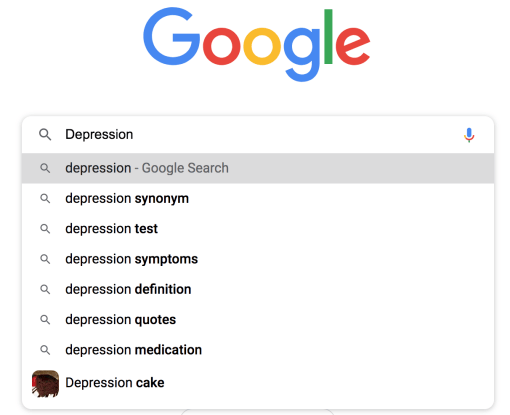
In the example above, you can see how “depression” (a single term) is not a clear keyword. This can pose a threat to your website since it does not cover much content, nor does it convert well.
You can think of Google as the “middle man”. It stands between the audience and your website. How can you set yourself apart from the competition?
You want to avoid using short-tail keywords. This can lead to unwanted traffic, causing problems for search matching… aka the search intent.
Long-Tail Keywords
Long-tail keywords consist of long, specific keywords. They comprise three words or more, representing 70% of all keywords. Falling in such a specific category, they offer users a convenient way of searching for particular topics.
Users are likely to use long-tail keywords when wanting to purchase an item or type of service.
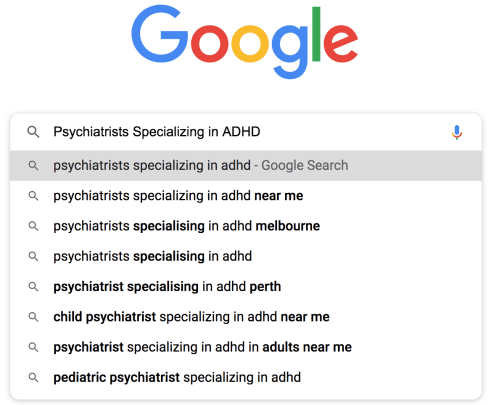
In the example above, you can see that this person is looking for a psychiatrist who specializes in ADHD. They narrow down their searches by stating “Psychiatrists Specializing in ADHD”. Individuals who use specific keywords and phrases know exactly what they are looking for.
The main thing to remember here is that once a person decides to make an appointment, they will use fixed keywords to find the answer to their question. Using long-tail keywords can lead to pinpointing their audience’s search intent.
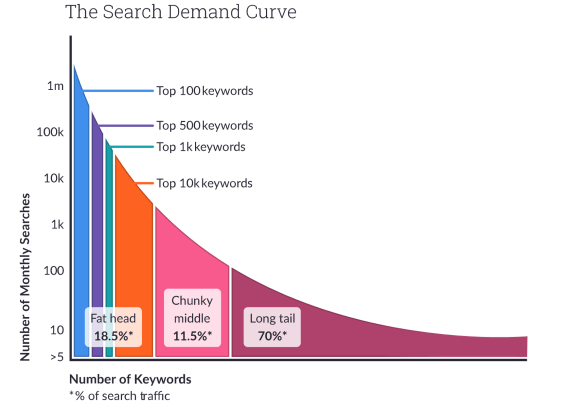
Monthly Search Volume
Monthly search volume tells you how many times, on average, people type a specific keyword into Google each month. For psychiatrists, this is very important because it shows what patients are actually looking for and how often.
For example, a keyword like “psychiatrist near me” might have thousands of searches each month, while something more specific like “psychiatrist for anxiety in Los Angeles” might only have a few hundred. High search volume keywords can bring more traffic, but they are usually very competitive, meaning many other psychiatrists and mental health websites are also trying to rank for them. On the other hand, lower-volume keywords may not bring as much traffic, but the people searching are often more serious about booking an appointment, which makes them very valuable.
By looking at monthly search volume, psychiatrists can choose which keywords to focus on, balancing big, popular searches for visibility with smaller, targeted ones that bring patients who are ready to reach out. In short, search volume helps you understand the size of the online “audience” for each keyword so you can plan smarter and reach more of the right people.
Keyword Difficulty
Keyword difficulty is a way to measure how hard it will be to rank for a specific keyword on Google. Think of it like choosing a hiking trail; some paths are short and easy, while others are steep and crowded with lots of people trying to get to the same spot.
For psychiatrists, a keyword like “psychiatrist” or “mental health doctor” has a very high keyword difficulty because thousands of practices, clinics, and big health websites are competing for those spots. But a more specific keyword like “psychiatrist for ADHD in Los Angeles” usually has lower difficulty, meaning you have a better chance of showing up on the first page.
Understanding keyword difficulty helps you focus your energy on realistic targets instead of wasting time chasing words that are almost impossible to rank for. By mixing in both lower-difficulty, specific keywords and some higher-difficulty ones, psychiatrists can build a balanced SEO strategy that brings traffic now while slowly working toward more competitive terms over time.
Using Relevant Keywords
Using relevant keywords means choosing the words and phrases that truly connect to what your patients are searching for, instead of just stuffing your website with random terms. For psychiatrists, relevance is especially important because people looking for mental health care are often searching with very personal needs in mind.
For example, if someone types “psychiatrist for depression near me” and your website talks clearly about your experience treating depression, Google is more likely to show your page. But if your site is filled with unrelated terms just to get clicks, patients will leave quickly because it doesn’t match what they were looking for.
That’s why it’s better to focus on accuracy and intent, use keywords that actually reflect your services, specialties, and the conditions you treat, like anxiety, ADHD, or bipolar disorder. When your keywords line up with what patients are searching, it not only improves your ranking but also builds trust because people feel like they’ve finally found the right psychiatrist for their situation.
Choosing The Right Target Keyword
Choosing the right target keywords is like deciding which signs to put up on the road that lead patients to your office. If you pick keywords that are too broad, like “psychiatrist”, you might get a lot of online traffic, but most of those people may not even be in your area or may be looking for a different type of help. On the other hand, if you choose keywords that are too narrow, like “psychiatrist who specializes in postpartum depression for women over 40 in downtown Los Angeles”, the audience may be so small that almost no one finds you.
The goal is to find a balance of keywords that are specific enough to attract the right patients but broad enough to bring in a steady flow of people. For psychiatrists, strong target keywords usually include a mix of service-based terms (like “child psychiatrist” or “ADHD medication management”) and location-based terms (like “psychiatrist in Los Angeles”). By carefully choosing your target keywords, you’re making sure your website shows up for the exact kinds of patients you want to help, rather than wasting energy on traffic that won’t turn into real appointments.
Keyword Research Tools
Keyword research tools are like flashlights that help you see what people are really searching for online. Instead of guessing what words patients might type into Google, these tools give you actual data so you can make smarter choices. For psychiatrists, this is very helpful because patients often use many different phrases when looking for mental health care.
Google’s Auto Complete Predictions
Google’s autocomplete predictions are the suggestions that pop up when you start typing something into the search bar, and they can be a goldmine for psychiatrists. These suggestions aren’t random; they’re based on what other people are actually searching for most often. For example, if you type “psychiatrist for…” you might see predictions like “psychiatrist for anxiety,” “psychiatrist for depression,” or “psychiatrist for ADHD near me.” Each of these suggestions shows you real, popular searches that potential patients are making.
This helps you discover not only the words people are using but also the problems they are looking to solve. By paying attention to these predictions, psychiatrists can create content and service pages that match what patients are already searching for. For example, if you notice lots of autocomplete results about anxiety treatment, you could write a blog post or create a dedicated service page about how you help patients manage anxiety. In this way, Google’s autocomplete acts like a window into your patients’ minds, giving you free insight into their most common questions and needs.

Google’s Related Searches
Google’s related searches are the list of extra suggestions you see at the very bottom of a search results page, and they can give psychiatrists powerful clues about what people are really looking for. Let’s say someone types in “psychiatrist near me” when they scroll down, they might see related searches like “best psychiatrist for depression,” “psychiatrist that accepts insurance,” or “child psychiatrist in Los Angeles.” These related searches are like Google’s way of showing you, “Here are other things people usually ask when they search for this topic.” For psychiatrists, this is very useful because it highlights the different angles patients are considering before making a decision.
By using these related searches, you can come up with blog post ideas, FAQ sections, or even new service pages that directly answer the questions people have. For example, if “psychiatrist that accepts insurance” shows up often, you might add a page on your site that clearly explains which insurance plans you accept. In short, Google’s related searches help you step into the shoes of your patients and create content that feels tailored to their exact needs.

Google Keyword Planner
Google Keyword Planner is one of the most popular tools for finding keywords, and the best part is that it’s free. It was originally built for advertisers using Google Ads, but psychiatrists can also use it for SEO to understand what people are searching for and how often. With this tool, you can type in a word like “psychiatrist” or “help with anxiety” and instantly see a list of related keywords, along with their monthly search volume and how competitive they are.
For example, it might show you that “psychiatrist near me” gets thousands of searches every month, while something like “psychiatrist for ADHD in Los Angeles” gets fewer searches but is less competitive and more targeted. This information is valuable because it helps you decide which keywords are worth focusing on, whether you want to aim for broader terms to increase visibility or specific terms to attract patients who are ready to book. For psychiatrists, Google Keyword Planner can act like a compass, pointing you toward the exact words and phrases your potential patients are using, so you can align your website content with what they’re searching for.

Ahrefs Free Keyword Generator
Ahrefs Free Keyword Generator is another helpful tool that psychiatrists can use to find out what people are searching for online, especially when they want to uncover long-tail keywords that don’t always show up in other tools. Long-tail keywords are longer, more specific phrases like “psychiatrist for social anxiety in Los Angeles” instead of just “psychiatrist.” What makes Ahrefs powerful is that it doesn’t just give you the main keyword; you also get a list of related ideas, along with important details like how difficult it might be to rank for those words and how many people search for them each month.
For psychiatrists, this can open your eyes to the exact questions and needs your potential patients have. For example, you might discover that people are searching for “psychiatrist that prescribes medication online” or “psychiatrist for teens with ADHD.” These insights can help you create specific web pages, blog posts, or FAQ sections that speak directly to those needs.
By using Ahrefs Free Keyword Generator, you get to see beyond the obvious searches and find opportunities where fewer competitors are showing up, giving your practice a better chance to stand out.

Why “psychiatrist near me”is a good keyword
-
High Buyer Intent: People searching “psychiatrist near me” are actively looking for mental health treatment. They’re not researching careers or definitions they’re ready to book an appointment.
-
Local Relevance: Psychiatry is a service that patients want close to home or work. This keyword taps into local SEO, showing your practice in Google Maps, the Local 3-Pack, and organic results.
-
Direct Conversions: This keyword attracts people who are at the decision stage they already know they need help, and now they’re choosing who to see.
-
Competitive Advantage: Ranking for this term positions your practice above others nearby, giving you more visibility to patients who are ready to act.
The keyword “psychologist vs psychiatrist” is not a good keyword if your goal is to attract new patients — here’s why:
- Informational Intent, Not Hiring Intent
People searching “psychologist vs psychiatrist” are trying to learn the difference between the two professions. They’re not looking to book an appointment with either.
- Wrong Audience. This keyword attracts:
-
-
Students writing papers,
-
Job seekers comparing careers,
-
Curious readers.
These are not individuals ready to schedule a mental health consultation.
-
- Poor Conversion Potential
Even if your page ranks, most visitors will read the explanation and leave. They won’t call your office or become patients, which makes it low-value traffic.
- Better Alternatives Exist. Instead of targeting “psychologist vs psychiatrist,” it’s better to rank for high-intent keywords like:
-
-
“psychiatrist near me”
-
“child psychiatrist near me”
-
“mental health doctor [city]”
-
These bring in people who actually need treatment now.
At YoYoFu Media, We Can Help You With Your On-Page SEO!
Schedule Your Free SEO Consultation!
Understanding Search Intent
Understanding search intent means figuring out the reason why someone is typing a certain keyword into Google. Not every search is the same. Sometimes people just want information, and sometimes they’re ready to book an appointment right away. For psychiatrists, this is especially important because the words people use often reveal where they are in their mental health journey.
Informational Intent
Informational intent happens when someone is searching for answers, not services, at least not yet. These are the kinds of searches where people are trying to understand their situation, learn about symptoms, or explore possible treatments. For psychiatrists, common informational intent searches might look like “what’s the difference between a psychiatrist and a psychologist,” “can psychiatrists prescribe medication,” or “signs you might need to see a psychiatrist.”
At this stage, the person isn’t ready to book an appointment, but they are gathering information that could lead them to professional care later. Creating blog posts, FAQ pages, or educational videos that answer these questions can help you show up in search results and build trust with people before they even think about scheduling. For example, if someone finds your article about anxiety treatment helpful, they’re more likely to remember your name when they finally decide to reach out for help. In short, informational intent is your chance to be a teacher, guide, and trusted resource for people who are just starting their journey toward mental health support.
Navigational Intent
Navigational intent is when someone searches online to find a specific website or page.
For psychiatrists, this might look like a patient typing in the name of your practice or your personal name because they already know who they’re looking for.
In these cases, the searcher doesn’t want general information about psychiatry; they want to get directly to your site, your contact page, or even your online booking portal. This type of intent is powerful because it usually means the person is closer to becoming a patient. To take advantage of navigational intent, psychiatrists should make sure their website shows up clearly when people search for their name or practice, keep their Google Business Profile updated, and use consistent naming across the web. In short, navigational intent is about being easy to find when patients are already looking for you specifically.
Commercial Intent
Commercial intent is when someone is seriously considering getting help but is still comparing their options before making a final choice. These searches often sound like “best psychiatrist for anxiety in Los Angeles,” “psychiatrist that takes insurance,” or “child psychiatrist reviews near me.” At this stage, the person already knows they want to see a psychiatrist; they’re just deciding which one.
For psychiatrists, this is the moment to really shine online. Having detailed service pages that explain your specialties, patient-friendly blog posts that answer common concerns, and strong online reviews all make a big difference here. Patients with commercial intent are looking for trust signals, like proof that you’re qualified, experienced, and approachable. They may also want to know about practical details, like whether you offer telepsychiatry or accept their insurance.
By providing clear, helpful information on your website and profiles, you make it easier for these patients to choose you over another provider. In other words, commercial intent is where patients are doing their “shopping,” and a strong online presence helps you become the obvious choice.
Transactional Intent
Transactional intent is the stage where someone is ready to take action they’re not just learning or comparing anymore, they want to book an appointment with a psychiatrist. These searches usually sound like “book psychiatrist near me,” “psychiatrist accepting new patients in Los Angeles,” or “schedule telepsychiatry appointment now.” At this point, the person has already made up their mind that they need professional help, and they’re simply looking for the fastest and easiest way to connect with the right provider.
For psychiatrists, this is where having a clear and simple website really matters. Your phone number, online booking link, and contact form should all be easy to find without a lot of clicking around. Offering options like “request an appointment” or “schedule a consultation” right on your homepage can make the process stress-free for someone who might already feel overwhelmed. Meeting transactional intent is about removing barriers and making it as easy as possible for patients to reach out and get the help they need.
Struggling With Putting Your Page Together?
Schedule A Free Strategy Session!
Technical SEO For Psychiatrists
Technical SEO is about making sure the “behind-the-scenes” parts of your website are set up correctly so that Google can easily understand, crawl, and rank your pages. While patients may never notice these details directly, they play a huge role in whether or not your site shows up in search results. For psychiatrists, technical SEO creates a strong foundation by making sure your website is secure, loads quickly, works well on phones, and avoids issues that could confuse search engines. A well-optimized website doesn’t just please Google, it also gives potential patients a smoother, more trustworthy experience, which makes them more likely to reach out for help.
SEO Ranking Tools
How do we keep up with relevant keywords? As our building block of SEO, there needs to be a way to measure its relevance and effectiveness.

When starting your medical business, it has been suggested to use SEO tools such as Keyword.com. This tool has been known to monitor and analyze a large group of keywords. Most people who use this tool start with the “Starter” plan for just $24 a month.
Keyword.com is highly recommended to marketers within the healthcare industry. The features included are a daily Google rank checker and a full analysis of keywords within your domain.
This tool can even monitor your competition’s keywords!
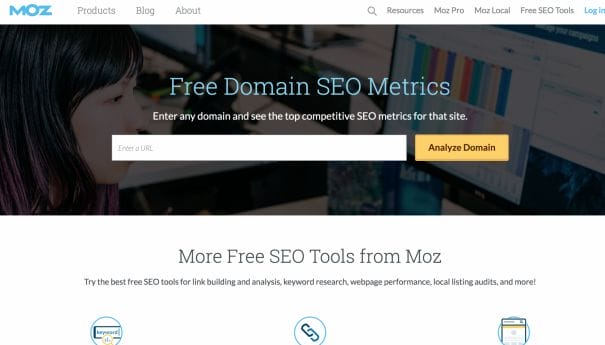
Another SEO tool that is well known within the digital realm is called Moz. This tool offers marketers the ability to analyze all organic performances of a website. You can examine & see all the important searches and page metrics using this software.
To all first-time users, Moz gives a 30-day free trial to use one of its best plans. This tool allows up to 800 keywords to be researched and no more than 5,000 keyword queries a month. With their premium plan, you can even unlock additional features like “speed crawl”.
Using speed crawl gives the crawler access to view your internal link structure of a website. The crawler inspects how your pages are performing and gives feedback on the right way on ways to optimize the site.
Page Speed
Page speed is how fast your website loads when someone clicks on it. If your site takes too long to load, patients may leave before even seeing your content. For psychiatrists, this is a big deal because many people searching for mental health help are already stressed, and waiting 10 seconds for a page to load can make them give up and go to another doctor. Simple fixes like compressing large images, reducing unnecessary code, or using a good web host can make your site load much faster. Google rewards faster websites with better rankings, and patients reward them with more trust.
Mobile-Friendly Website
A mobile-friendly website looks and works great on phones and tablets, not just computers. Since most people search for psychiatrists on their phones, this is critical for attracting new patients. A mobile-friendly site means text is easy to read, buttons are big enough to tap, and the design adjusts to fit any screen. Google now ranks websites based on their mobile version first, so if your site doesn’t work well on a phone, you risk losing both patients and search visibility.
Keyword Cannibalization
Keyword cannibalization happens when you have multiple pages on your website targeting the same keyword. For example, if you write two separate blogs about “signs of depression,” Google may get confused about which page to rank, and both could end up ranking poorly. For psychiatrists, it’s better to create one strong, detailed page for each topic instead of splitting it into many similar ones. This makes it clearer for both patients and search engines what your best resource on that subject is.
Fix Duplicate Content
Duplicate content means having the same or very similar information on more than one page of your website. Google doesn’t like this because it looks repetitive and can make your site seem less trustworthy. For psychiatrists, duplicate content often happens by accident, for example, if your services page and a blog post use the same text. Fixing this could mean rewriting content to make it unique or combining similar pages into one stronger page.
Fix Broken Links
Broken links are links on your site that don’t work anymore, usually because the page was deleted or the URL changed. When patients click a broken link, they land on an error page, which feels unprofessional and frustrating. Google also sees broken links as a sign that your site isn’t well-maintained. For psychiatrists, regularly checking for and fixing broken links helps keep your site clean, trustworthy, and easy to navigate.
You can use Ahrefs’ free broken link checker.

Here is a blog post about broken links that Semrush made. You can also check it out to know more about broken links.
At YoYoFuMedia, we give great tips like which SEO tools to use, but did you know we also help psychiatrists directly?
On-Page Optimization For Your Psychiatry Site
Within the next few sections, we will learn the many ways to optimize a website. To become a successful SEO practitioner, this requires you need to improve a few areas. You will learn how the title tag, content, meta descriptions, and internal link building are all needed to enhance your website.
For the best performance, see how each of these areas comes into play when maximizing your on-page SEO.

Title Tag
The Title Tag is known to be a prime centerpiece of on-page optimization. It’s an element of HTML that specifies the title of your website. The title tag is important to all social users since it’s one of the first items that is seen when entering a search query.

For psychiatrists, a good title tag should be clear, include important keywords, and still sound natural. For example, instead of just writing “Home” as your title, a better one would be “Psychiatrists and Psychiatric Nurses in Fresno, CA”
This way, patients immediately know what you do, where you are, and why they should visit your site. Google also uses title tags to understand the topic of your page, which can help you rank higher when people search for mental health services. Each page of your website should have its own unique title tag that matches the content on that page. Keeping them short (around 50–60 characters) and descriptive is best because longer ones may get cut off in search results. In short, title tags are like your website’s first impression they can make the difference between someone clicking your site or skipping past it.

Url Slugs
A URL slug is the part of a web address that comes after your main website name, and it plays a bigger role in SEO than most people realize. For example, if your website is www.drjohnpsychiatry.com and you have a page about anxiety treatment, the slug might look like /anxiety-treatment instead of something messy like /page?id=123. A clean, simple slug makes it easier for both Google and patients to understand what the page is about.
For psychiatrists, this is especially useful because patients are often searching for very specific services, like “depression-treatment” or “child-psychiatrist.” By including keywords in your slugs that clearly describe the page, you increase your chances of showing up in search results. At the same time, shorter and more descriptive slugs make your links look more professional and trustworthy when patients see them shared online or in search results. In short, a well-written URL slug is like giving both Google and your patients a clear signpost that says, “This is exactly what this page is about.”

Meta Description
Your Meta Description is similar to the title tag from earlier. It, too, is an element of HTML that provides a layout of what your website is about. This information usually appears on the search engine results page (SERP).
Optimizing this meta description can help your on-page SEO indirectly. This allows others to read the page description before even clicking on the actual site.

Within the meta description, you can have a max of 160 characters for the section. Writing key information about your website can increase your click-through rates. Add targeted keywords that will attract your patients. This can include something like the types of services your clinic provides.
The Meta Description HTML Code:
<head> <meta name="description" content="This is an example of a meta description. This will often show up in search results."></head>
Alt Tags
Alt tags, also called “alternative text,” are short descriptions you add to the images on your website. Even though patients might not always see them, alt tags are very important because they tell Google what the image is about. For example, if you have a picture of your office, the alt tag might say “psychiatrist’s office in Los Angeles with a welcoming waiting room.”
This not only helps your website show up in image searches but also improves your overall SEO because Google can connect your images with relevant keywords. Alt tags are also important for accessibility. Screen readers use them to describe images to people with vision impairments, which makes your website more inclusive and user-friendly. For psychiatrists, this is especially valuable because a calm office photo with the right alt text can help potential patients feel more comfortable before they even step through your doors.
In short, alt tags are small details that carry a lot of weight, helping both Google and patients better understand your website while also making it more welcoming to everyone.

Internal Link Building
What is a link? Do you know the difference between a normal link and an internal link?
Internal Links are generally displayed as a link from one specific page (one of your psychiatric pages, such as “home page”) that takes you to another page (let’s say “type of services” on a separate page of your website).
Search engines like seeing these internal links since they allow crawlers to search your site. This can enhance the ability of SERP to better rank your website.
The Importance of Internal Links:
- Allow visitors to easily scroll through the website.
- Establishes some kind of hierarchy within the site.
- Spreads link equality throughout the website.
Including internal links can be a tricky process at first. So if at any time you feel uneasy about this, we would be more than happy to assist with your SEO. Book a Free Strategy Session with/ Us, we can dive into further details on ways to include your internal links.
External Links
External links are the links on your website that point to other trustworthy websites, and they play an important role in SEO. Some people think linking out to other sites will take traffic away, but in reality, it shows Google that you’re providing helpful, well-researched information. For psychiatrists, this could mean linking to respected sources like the American Psychiatric Association, Mayo Clinic, or National Institute of Mental Health when you mention treatment methods, medications, or mental health statistics.
Doing this makes your content stronger because it proves to both Google and your readers that you’re backing up your information with reliable sources. Patients are more likely to trust you if your articles guide them to additional resources, and Google is more likely to rank your pages higher because it sees your site as part of a trustworthy network.
The key is to only use external links that are relevant and authoritative, rather than random or low-quality sites. In short, external links are like giving your readers a map to more useful knowledge while also building credibility for your own website.
Compressing Large Images And Files
Compressing large images and files is one of the easiest ways to make your website faster, and speed really matters for both patients and Google. When your site is filled with big, heavy photos or documents that take a long time to load, visitors may get frustrated and leave before they even see your content. For psychiatrists, this is especially important because many patients searching for help online are already stressed or anxious they don’t want to wait around for a slow site to load.
By compressing images and files, you reduce their size without making them look blurry or unprofessional. For example, instead of uploading a giant 5 MB photo of your office, you can shrink it down to a smaller version that still looks clear but loads much faster. The same goes for large PDF files, such as patient forms; you can compress them so patients can open and download them quickly. A faster site improves user experience, builds trust, and helps your pages rank higher in Google searches.
In short, compressing images and files is a small technical step that makes a big difference in keeping your website smooth and patient-friendly.
Improving Readability
Improving readability means making your website’s content easy to understand, so patients can quickly get the information they need without feeling overwhelmed. For psychiatrists, this is especially important because people searching for mental health support may already feel stressed, and complicated medical jargon can make them click away.
Instead of using long, technical sentences, try writing in a friendly, clear tone that explains things simply, like saying “psychiatrists can prescribe medication to help manage symptoms” instead of using heavy medical terms. Breaking up big chunks of text into shorter paragraphs, adding bullet points, and using headers also make it easier for patients to scan your content and find what matters to them. Even small changes like using larger fonts, clear spacing, and calming colors can make your site feel more welcoming.
The goal isn’t to “dumb down” your information but to make sure patients of all backgrounds can understand it and feel comfortable reaching out. When your content is readable, it not only keeps visitors on your site longer but also helps Google rank your pages higher, since search engines reward sites that are easy for users to navigate and understand.
Optimizing Website
Optimizing your website means making sure every part of it is working together to be user-friendly, professional, and easy for Google to understand. For psychiatrists, this includes both the technical side and the patient experience. On the technical side, optimization means having a fast-loading, mobile-friendly, and secure site (using HTTPS) so that visitors feel safe and don’t get frustrated with slow pages.
On the patient side, it means designing your website so people can easily find important information like services, office hours, insurance options, and how to book an appointment. Adding clear headings, simple navigation menus, and organized pages helps visitors quickly get where they need to go. Optimizing also involves using the right keywords in your content, titles, and URL slugs so Google knows what your site is about and can match it with the right searches.
When your website is optimized, it not only looks professional and trustworthy but also ranks better in search results, which means more potential patients will find you. In short, website optimization makes your site both Google-friendly and patient-friendly, which is exactly what psychiatrists need to grow their practice online.
Off-Page SEO
Off-page SEO is everything you do outside of your website to improve how trustworthy and visible your practice looks to Google and to potential patients. While on-page SEO focuses on your actual website, off-page SEO is about building your reputation across the internet. For psychiatrists, one of the most powerful parts of off-page SEO is getting backlinks, which are links from other respected websites that point to yours, almost like a “vote of confidence” telling Google your site is reliable.
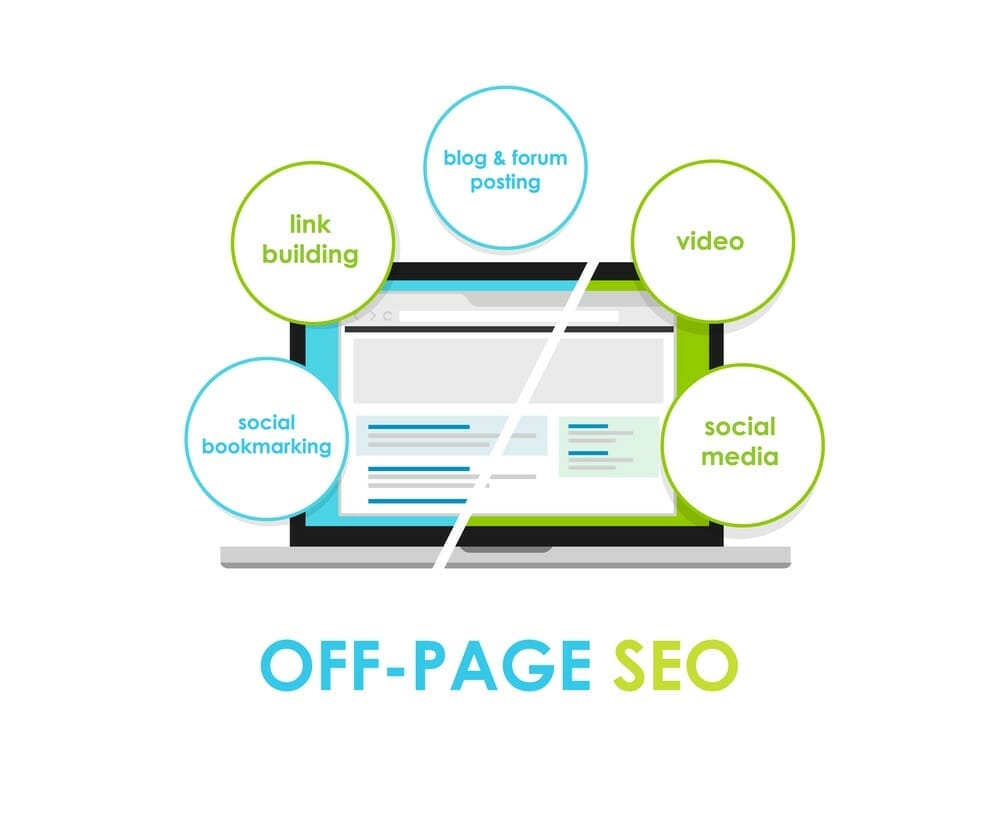
Audience/ Backlinks
Get to know your audience! Forming some kind of interaction with them can increase your traffic flow. Try to target a specific group of people. You don’t want to attract unnecessary traffic that can lead to them bouncing right off.
Backlinks are links from other websites that point back to your own, and they work like online recommendations. The more trusted websites that “recommend” you with a backlink, the more Google believes your site is important and reliable. For psychiatrists, getting backlinks from high-quality sources like health blogs, local hospitals, medical associations, or community organizations can make a big difference in your rankings.
For example, if a local news site writes an article about mental health awareness month and links to your practice as a resource, that backlink tells Google that you’re a trustworthy professional. But not all backlinks are created equal links from random or spammy sites can actually hurt your SEO. That’s why it’s better to focus on earning a few strong backlinks than trying to collect hundreds of low-quality ones. Some good ways for psychiatrists to build backlinks include writing guest posts, partnering with local health groups, or being featured in online interviews. Backlinks not only help your SEO but also bring more patients directly to your site because people trust recommendations from respected sources.
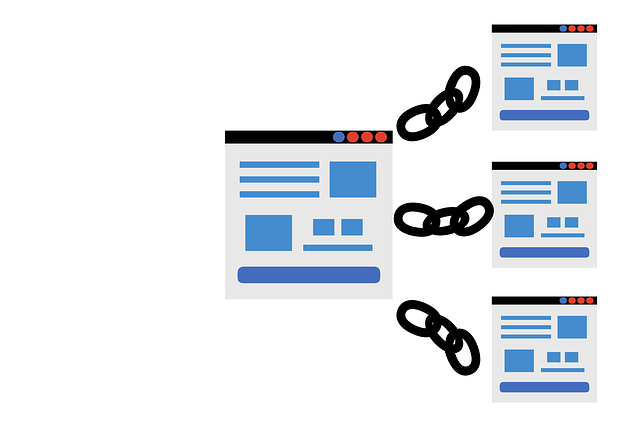
Does backlinking sound like a great idea, but you just don’t have time as a psychiatrist?
What is SERP
SERP is the front page of Google that responds to individuals’ search queries. The page that often appears after a search gets mixed in with other content. This content comprises paid ads, organic texts, and even “rich answers” such as Quick Answers.
You want to rank as high as possible on SERP. The higher you rank, the likely your search traffic will increase. An average of 75.1% of all clicks occur within the first three results. To rank well, you need to perform a mixture of on-page and off-page optimization.
There Are Predominantly 2 Types of Organic Searches That Most Individuals Do:
- Informational
- Navigational
Informational searches are queries that individuals search for when wanting to learn more about a particular topic. For instance, take the example of Psychiatrists Specialising in ADHD. This suggests that the user wants to find a specific psychiatrist.
If it leads to the correct content, this can drive people to visit and book an appointment to learn more.
Navigational searches are those that people make to hopefully look for a specific website. This type of query can be difficult for users to make, especially if you hadn’t ever landed on the site. For example, imagine someone who daily visits their Facebook account. If they type out “Facebook,” there is a good chance that before spelling out the whole word, Google will autofill the rest of the URL.
Both of these organic searches work well, but there is only one that the majority of your audience will use. This is an informational search since the information from your site will serve as a resource to them. If they feel like your site is valuable and relevant to them, they will likely book an appointment.
Guest Posting
Guest posting is when you write an article or blog post for another website, and it’s a smart way for psychiatrists to build credibility while also improving SEO. Instead of only publishing content on your own website, you contribute to trusted health blogs, local news sites, or mental health organizations’ websites. In return, most sites allow you to include a short bio or a link back to your practice’s website. This does two important things: it shows Google that your site is connected to other respected websites (which improves your rankings), and it introduces you to new audiences who might not have found you otherwise.
For example, writing an article like “5 Signs It’s Time to See a Psychiatrist” for a local health blog can position you as an expert while gently guiding readers toward considering professional help and, ultimately, your services. Guest posting also builds trust because patients see that your knowledge is valued outside your own practice. For psychiatrists, this is especially powerful since mental health is such a personal decision. Seeing your name on respected platforms can make new patients feel more confident reaching out to you.
Social Media Marketing
Social media marketing is about using platforms like Facebook, Instagram, LinkedIn, or even YouTube to share helpful content, connect with people, and bring more attention to your practice. For psychiatrists, social media isn’t about advertising in a pushy way; it’s about building trust and showing patients that you understand their struggles. Sharing simple posts about mental health tips, stress management, or reminders to take care of yourself can make your profile feel supportive and approachable.
When patients see your consistent presence online, they’re more likely to view you as a knowledgeable and caring professional. Social media also helps with SEO indirectly, because the more your content is shared, the more chances people have to visit your website, leave reviews, or even link back to your content. For example, posting a short video explaining the difference between a psychiatrist and a psychologist could educate people while gently guiding them toward booking an appointment.
The key is consistency, showing up regularly with valuable, professional content, so your audience knows you’re active and reliable. In short, social media marketing helps psychiatrists expand their reach, build trust with potential patients, and drive more people to their website without relying only on Google.
Content Marketing
Content marketing is all about creating and sharing helpful information that answers people’s questions and builds trust with your audience. For psychiatrists, this could mean writing blog posts about common mental health topics, recording short videos that explain treatment options, or even creating downloadable guides like “How to Manage Anxiety at Work.” The goal isn’t to sell directly, but to provide value so patients see you as a reliable expert. When your content is useful, people stay on your site longer, share it with others, and may even return later when they’re ready to book an appointment.
Content marketing also helps SEO because the more high-quality content you publish, the more chances Google has to show your site in search results. For example, if someone searches “symptoms of depression” and you have a clear, informative article on it, your website has a higher chance of showing up.
Over time, this builds a library of resources that positions you as a go-to professional in your community. In short, content marketing is like planting seeds: every blog post, video, or resource you share grows trust and makes it more likely that patients will choose your practice when they’re ready for help.
Local Listings
Local listings are online profiles that show important information about your psychiatry practice, like your name, address, phone number, website, and office hours. Think of them as digital business cards that appear when someone searches for a psychiatrist in your area.
For psychiatrists, being listed on Google Business Profile, Bing Places, Healthgrades, and other trusted directories is crucial because patients often look for local mental health professionals near them. When your information is correct and consistent across all listings, it helps Google trust your business and show it higher in local search results.
For example, if someone types “psychiatrist near me” into Google, a complete and accurate listing makes it more likely your practice will appear in the map pack at the top of the page. Local listings also help patients quickly see your office hours, read reviews, and even get directions to your clinic. On the other hand, if your listings have mistakes like the wrong phone number or outdated address, you risk losing patients before they ever reach out. In short, local listings make it easier for patients to find and contact you while also boosting your local SEO rankings.
Online Forums
Online forums are places where people gather on the internet to ask questions, share experiences, and look for advice. For psychiatrists, joining mental health-related forums or community groups (like Reddit, Quora, or specialized health boards) can be a smart way to connect with people who may need help. The goal isn’t to promote your services directly but to provide thoughtful, supportive answers that show your expertise.
For example, if someone in a forum asks, “What’s the difference between anxiety and panic disorder?” you could give a clear, simple explanation and gently mention that psychiatrists can diagnose and treat these conditions. Over time, this builds trust with readers and positions you as a reliable expert. Many forums also allow you to include your website link in your profile, which can quietly drive visitors back to your practice.
Participating in online communities helps your off-page SEO because it increases your visibility, creates more chances for people to discover your website, and shows that you’re active in the larger conversation about mental health. In short, online forums let psychiatrists share knowledge, support people in need, and attract potential patients without sounding pushy.
How does this knowledge about navigational vs informational search help build your website?
Common SEO Mistakes to Avoid for Psychiatrists
Even the best psychiatrists can make mistakes when it comes to SEO, and these errors can hold back your website from reaching new patients. Many of these mistakes happen because people try to rush the process or focus too much on “tricking” Google instead of building trust. SEO works best when it’s natural, patient-friendly, and focused on creating a good online experience. Below are three of the most common SEO mistakes psychiatrists should avoid.
Keyword Stuffing and Over-Optimization
One of the biggest mistakes is keyword stuffing, which means repeating the same keyword too many times on a page in hopes of ranking higher. For example, writing “psychiatrist in New York” over and over again in every sentence makes the content sound robotic and unhelpful. Patients don’t like reading it, and Google is smart enough to recognize it as spammy.
Instead, focus on writing naturally, use your main keyword a few times, mix in related words, and always write as if you’re speaking directly to a patient. Over-optimization also includes things like stuffing keywords into page titles, alt tags, or meta descriptions, which can hurt your credibility instead of helping.
Neglecting Mobile Optimization
Another common mistake is ignoring how your website looks and works on mobile devices. Since most people search for psychiatrists on their phones, a site that isn’t mobile-friendly can cause patients to leave within seconds. They won’t waste time pinching, zooming, or scrolling around to find your contact information.
On top of that, Google now uses mobile-first indexing, which means your mobile site matters even more than your desktop site for rankings. If you neglect mobile optimization, you’re essentially telling both Google and potential patients that your site isn’t ready for them.
Ignoring User Experience (UX)
The third big mistake is ignoring user experience (UX). UX is about how easy and pleasant it is for patients to use your site. If your website is slow, hard to navigate, or filled with confusing menus, patients will likely leave and never come back. Google pays attention to this behavior. If people keep bouncing off your site quickly, it signals that your content isn’t helpful, and your rankings may drop.
For psychiatrists, a good user experience means having a clean layout, clear contact buttons, simple appointment forms, and helpful content that answers questions. Think of your website as your digital office: if it feels welcoming and easy to use, people will feel more comfortable reaching out for help.
If You’re Struggling With Your SEO. We Are Here To Help!
The Value of SEO For Psychiatrists
The world of business is inevitably changing. There used to be a time when ads would only appear on TV, newspapers, and even the radio. It’s important that, within the medical field, people get ahead using SEO strategies. Sooner or later, you will realize that this will be the tactic that most will use to gain their patients.

Goals That Can Be Achieved Using SEO:
- Drive new patients (traffic) to your site.
- Improve online presence.
- Create exposure to a marketed audience based on keywords.
SEO will keep on increasing throughout all healthcare despite competition. Using this type of tool could serve well for psychiatrists to connect with their patients. Use this guide to market your service to all within your audience group.
For any further questions regarding SEO, you can always contact us. Book a Free Strategy Session with us so we can continue growing your psychiatry practice.
Related Articles to Read:
Search Engine Optimization Guide for Orthopedic Surgeons



